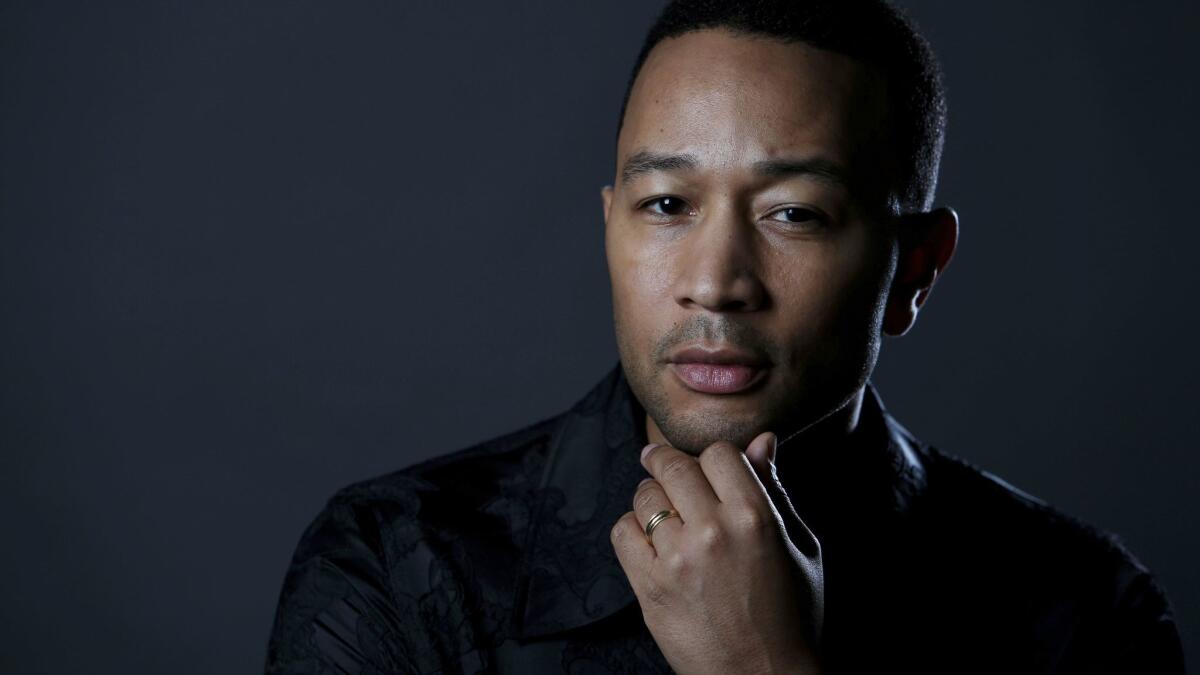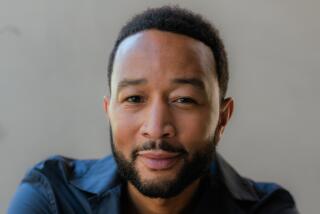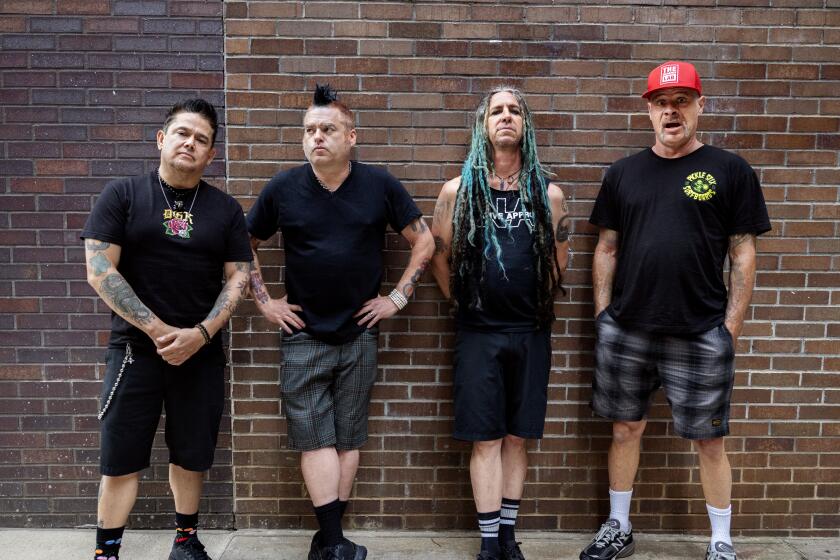With topical ‘Darkness and Light,’ John Legend wants to ‘contribute to the conversation’

John Legend knows there are two ways people think about him.
To many, he’s the smooth-talking pop star famous for his big voice and polished love songs, the dapper family man who peppers Instagram with photos of his wife, model Chrissy Teigen, and their 7-month-old daughter.
“And then there’s the guy out here talking about mass incarceration on ‘Bill Maher,’” he said recently with a laugh.
These differing John Legends have tended not to show up in the same place at the same time. You certainly got little sense of the fight for social justice from “All of Me,” the syrupy piano ballad that became Legend’s biggest hit when it went to No. 1 on Billboard’s Hot 100 in 2014.
Nor were you glimpsing a harmless heartthrob when he appeared on Maher’s HBO talk show days after the presidential election and said of Donald Trump, “We have a racist running the country.”
Yet the singer’s two sides begin to come together on his tellingly titled new album, “Darkness and Light.” Due Dec. 2, it takes up some of Legend’s familiar themes but puts them in the context of what he referred to as America’s “political unrest.” The album also retools his sound, moving away from the slick pop-soul arrangements for which he’s known toward a moodier, more organic vibe he developed with producer Blake Mills and a diverse cast of top-flight musicians.
“They say, ‘Sing what you know’ / But I’ve sung what they want,” Legend declares to open the 12-song set. “Some folks do what they’re told / But, baby, this time I won’t.”
Sitting in a small green room before an invite-only performance this month at a Los Angeles art gallery, the 37-year-old born John Stephens said his goal with the album was “just to be honest and talk about the things I’ve been thinking about.”
“If you follow me on Twitter, you know I have a point of view,” he added. “I want to do the same with my art. I want to contribute to the conversation.”
Longtime fans of Legend, who got his start as a sideman to the likes of Lauryn Hill and Kanye West, realize he’s touched on politics before. In 2010, he teamed with the Roots for a collaborative disc, “Wake Up!,” on which they covered protest songs from the ’60s and ’70s.
And he and rapper Common won an Academy Award last year for “Glory,” their anthem about the civil rights movement from Ava DuVernay’s film “Selma.”
But “Darkness and Light” represents Legend’s first time integrating his social and cultural views into the kind of personal stories favored in pop and R&B. In “Penthouse Floor,” he describes how wealth can dull one’s sensitivity to others’ hardship — and does so with clear knowledge of life at the top. “Right By You” imagines what the world might look like once his daughter has grown up.
It’s not that Legend didn’t want to try this earlier. “But the things I think about when it comes to policy, they don’t sound good in a song,” he said. “It was a struggle to figure out how to do it without seeming corny or pedantic.”
He also worried about merely echoing the work of others, such as Marvin Gaye, whose landmark “What’s Going On,” from 1971, is “the perfect album that was sensual but also political at the same time,” Legend said.
“Where do you go from there?”
One path opened up thanks to “Between the World and Me,” writer Ta-Nehisi Coates’ acclaimed 2015 book about the state of race in America. Mills said he and Legend were drawn to the way Coates “doesn’t purport to have all the answers” to the problems he lays out, which inspired them to write about those issues in an “emotional” way.
As an example, Legend pointed to the album’s closer, “Marching Into the Dark.” It’s about “the idea of struggle and the idea of putting your life on the line for an important cause,” as Medgar Evers and Martin Luther King Jr. had, he said. “The metaphor we use is that they’re chasing a fading star into the dark. They’re struggling for an end they may never see.”
Legend said he was familiar with that uncertainty. “Everything I talk about — improving our schools, prison reform, making sure everyone has an equal opportunity — I don’t know if we’ll ever get there,” he said. “Frankly, I’m pessimistic. But I’m optimistic enough to know that even the little wins count. So the struggle is worth it.”
Along with its powerful lyric — “What good is a dream when the dreamer dies?” Legend sings — “Marching Into the Dark” shows off the album’s distinctive sound, with Mills’ nimble guitar playing over a lurching funk groove. Other standouts include “Surefire,” with eerie strings, and the title track, a scratchy soul-rock duet with Brittany Howard of the Alabama Shakes.
Legend sought out Mills after being impressed by the Shakes’ Grammy-nominated “Sound & Color,” which Mills produced. And as he did on that album, Mills emphasized live musicianship, in this case building a studio band around what he deemed the best rhythm section in the world: bassist Pino Palladino and drummer Chris Dave.
The colorful but uncluttered arrangements — which also feature organist Larry Goldings and saxophonist Kamasi Washington, among other players — pushed Legend to explore new wrinkles in his voice, according to Mills.
“We wanted some grit to come through,” the producer said, “instead of just hearing the top part of his voice that’s carrying the melody.”
Miguel, the adventurous R&B singer who duets with Legend on the slinking “Overload,” remembered being struck by the “edgy” textures he heard the singer and Mills handling in the studio.
“It made me go, ‘Oh damn! Bro is coming with some” stuff, Miguel said, using a stronger word. “The whole thing has a very progressive tone. It was exciting to see that John wanted to take a creative risk.”
As it happens, “Darkness and Light” isn’t the only project in which Legend is testing out new modes. He also has a small acting role in “La La Land,” director Damien Chazelle’s modern-day movie musical that won rave reviews on the festival circuit this year.
In the film, which opens next month and stars Ryan Gosling as a proudly anachronistic jazz pianist, Legend plays a more successful musician who urges Gosling’s character to adapt or be left behind.
That’s a message that clearly applies to Legend’s career, with its occasional forays into hip-hop and EDM. Indeed, Chazelle said the singer improvised most of the big speech he delivers in “La La Land.”
But Legend insisted he’s never created music “just to make myself more acceptable to people.” And it’s hard to argue with him regarding “Darkness and Light,” given the album’s potential to turn off some fans at this starkly divided moment.
“Sometimes people say, ‘Shut up and sing,’” Legend said with a shrug as he prepared to head onstage. “It’s fine. I think of it as part of the job.”
Twitter: @mikaelwood
ALSO
Sharon Jones was an old soul in a changing world
What do She & Him want for Christmas? ‘Real instruments’ played by humans
On ‘The Weight of These Wings,’ Miranda Lambert tells her side of a very public story
More to Read
The biggest entertainment stories
Get our big stories about Hollywood, film, television, music, arts, culture and more right in your inbox as soon as they publish.
You may occasionally receive promotional content from the Los Angeles Times.











